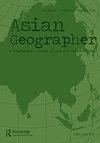Landlessness as the key challenge to climate change adaptation of the rural poor in Bangladesh: an empirical study
IF 2.2
Q2 GEOGRAPHY
引用次数: 3
Abstract
ABSTRACT Bangladesh is ranked top among the locations most affected locations by extreme weather events over the last two decades and one of the potential victims of the consequences of climate change. Around 3.26 million rural Bangladeshi households are landless. These landless households usually constitute the poorest and most vulnerable groups in Bangladesh and are the first victims of climatic hazards. Despite the adaptation measures taken by the government and non-governmental organizations, landlessness generates constraints to adapt to the changing environment. Taking the above premises, this paper principally aims to unveil how landlessness poses challenges for the rural poor of Bangladesh in their endeavor to adapt to already emerging conditions of climate change. Based on qualitative interviews of relevant stakeholders, this paper finds that landlessness is a key challenge to the climate change adaptation process as it hinders livelihoods and income-generating activities of the people living in rural and coastal regions. Moreover, this study finds that landless people living near urban spaces are better placed to migrate to the cities for livelihoods and shelter. This study also adds insightful evidence suggesting that lack of access to land or land entitlement is a major setback to the existing climate change adaptation policy in Bangladesh.无地是孟加拉国农村贫困人口适应气候变化的关键挑战:一项实证研究
孟加拉国是过去二十年来受极端天气事件影响最严重的地区之一,也是气候变化后果的潜在受害者之一。孟加拉国大约有326万农村家庭没有土地。这些无地家庭通常是孟加拉国最贫穷和最脆弱的群体,也是气候灾害的第一批受害者。尽管政府和非政府组织采取了适应措施,但土地缺乏对适应不断变化的环境产生了制约。在上述前提下,本文的主要目的是揭示无地如何给孟加拉国农村贫困人口在努力适应已经出现的气候变化条件时带来挑战。基于对相关利益相关者的定性访谈,本文发现无地是气候变化适应过程中的一个关键挑战,因为它阻碍了生活在农村和沿海地区的人们的生计和创收活动。此外,本研究还发现,居住在城市附近的无地人口更适合迁移到城市寻找生计和住所。这项研究还增加了有见地的证据,表明缺乏获得土地或土地权利的途径是孟加拉国现有气候变化适应政策的主要挫折。
本文章由计算机程序翻译,如有差异,请以英文原文为准。
求助全文
约1分钟内获得全文
求助全文
来源期刊

Asian Geographer
GEOGRAPHY-
CiteScore
3.30
自引率
0.00%
发文量
7
期刊介绍:
Asian Geographer disseminates knowledge about geographical problems and issues focusing on Asia and the Pacific Rim. Papers dealing with other regions should have a linkage to Asia and the Pacific Rim. Original and timely articles dealing with any field of physical or human geographical inquiries and methodologies will be considered for publication. We welcome, for example, submissions on people-environment interactions, urban and regional development, transport and large infrastructure, migration, natural disasters and their management, environment and energy issues. While the focus of the journal is placed on original research articles, review papers as well as viewpoints and research notes under the category of “Asian Geography in Brief” are also considered. Review papers should critically and constructively analyse the current state of understanding on geographical and planning topics in Asia. The ‘Asian Geography in Brief’ section welcomes submissions of applied geographical and planning research about Asia. The section aims to showcase (1) the diverse geography and planning of Asia; and (2) the diverse geographical and planning research about Asia. The journal will also publish special issues on particular themes or areas. Book reviews can be included from time to time.
 求助内容:
求助内容: 应助结果提醒方式:
应助结果提醒方式:


